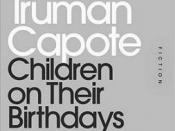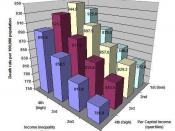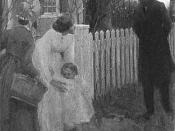In the short story, "The Lesson," Toni Bambara reveals the injustice in society in the United States through the eyes of young ghetto children. A field trip to an expensive toy store exposes the bitter truth of society; not everyone has an equal opportunity to make money. In the children's view, everyone should have an equal standard of living. Toni Bambara effectively articulates the unfairness of economic inequality through the use of three short story elements: language, character, and theme.
The author chooses to use informal diction to closely relate the readers to the economic problems that children are facing. The children in the story speak non-standard English. Instead, they speak in AAVE, or African American Vernacular English; throughout the story the reader can easily find slang and other colloquial expressions, such as "sorry-ass... goddamn gas mask." (pg.90) Although it may sound disturbing, this authentic voice adds realism and humor to the story.
The narrator's diction provides us with clues about the background of characters; her frequent usage of non-standard English indicates that Sylvia is not educated. She uses a phrase, "nappy head bitch," (pg.90) which both denotes and connotes. The word "nappy head" denotes "small tight curls." However, it has a negative connotation which is used in colloquial or derogatory reference to the hair of black people; it is a racist term against black people. Informal diction also narrows the gap between the reader and the text, thus emphasizing the economic injustice. If the story were written in formal diction, it would not have had the same effect; we would not realize the profound unfairness of society.
By selecting African American ghetto children as major characters, the author adds reality to the economic difficulties that they face, and highlights the unfairness of society. The children in the story...


